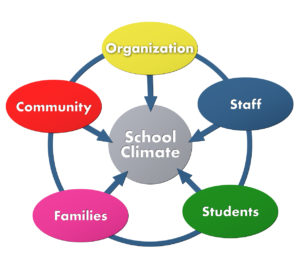Research and experience demonstrates that creating a secure and safe school depends not only upon security measures, but upon building cultures and climates of connection, respect and empowerment. The evidence is clear. When schools focus on strengthening relationships among all stakeholders – staff, students, families and community, they achieve increased attendance, improved academic achievement and reduced behavioral incidents.
This “Inside-Out” Approach results in a more positive school climate where students experience a sense of safety, have healthy adult and peer relationships, and feel respected and empowered. All of which contribute to enhanced success, academically and socially-emotionally. The Inside-Out Approach is the foundation from which we build, develop, and deliver all our programs and services, and is comprised of four core elements:
- Relationships – Creating opportunities for students, staff, parents, families and the broader community to establish relationships; building trust and mutual respect while establishing and maintaining an open channel of communication.
- Student-Centered – Empowering youth by involving them in problem-solving, decision-making and implementing solutions.
- Restorative Practices – Employing Restorative Practices helps students learn from their mistakes and make amends, leading to improved relationships, reduced discipline incidents and safer schools.
- Social Norms Change – Guiding and changing behavior not through rules and policies but through social norms, which are largely established and can be changed by students.
Our programs and services are organized around our Whole School Climate Framework, the components of which, contribute to a comprehensive and sustainable approach to improving school climate, decreasing bullying and cyberbullying-related incidents and suspensions, leading to enhanced social and academic success and increased attendance.
Each component can be implemented separately or as a multi-pronged approach, providing the flexibility to address each school or district’s specific culture, needs and goals.
The Whole School Climate Framework is based on the five determinants and is aligned with emerging national school climate standards:
- Organization
We help organizations develop a deeper understanding of the vital role that school climate plays in achieving educational outcomes and a plan to achieve them.
Learn more about our Whole School Climate 360 Assessment - Staff
We help schools and other educational organizations engage, empower, and equip their staff (certificated, classified and administrative) to reduce bullying, build a positive climate and promote educational excellence.
Learn more about our Professional Development Trainings - Students
We help schools engage, empower and equip students to work in partnership with adults to create and maintain a positive climate.
Learn more about the Safe School Ambassadors program - Families
We help schools engage and educate parents with knowledge and skills to act when they or their children witness bullying, harassment and cyberbullying.
Learn more about our Parent Workshop - Community
We help communities bring together all the stakeholder groups responsible for raising, educating and protecting children and youth. We also provide facilitation, presentations and trainings for a range of community and governmental organizations.
Learn more about the Safer School Symposium